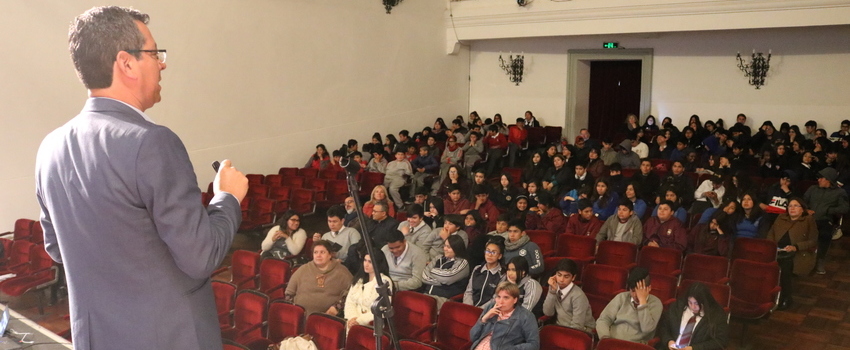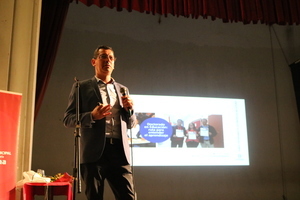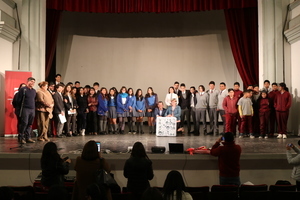- News
University of La Serena challenges students to become the scientists of the future

150 young people from different public establishments in the La Serena commune were motivated through TED talks, organized by the Science and Technology Dissemination and Dissemination Team of the ULS and the Gabriel González Videla Corporation.
Within the framework of the “Awakening Scientists of the Future” program and in celebration of Science Month, a scientific and pedagogical talk was held, aimed at schoolchildren from municipal schools and high schools of La Serena, an initiative that is part of the cooperation agreement between the University of La Serena and the Gabriel González Videla Municipal Corporation.
 Through TED talks (Technology, Entertainment and Design), we seek to disseminate inspiring ideas and speeches that can “change the world” in scientific matters, with the aim of promoting knowledge and equity in access to science, for the benefit of students. and teachers.
Through TED talks (Technology, Entertainment and Design), we seek to disseminate inspiring ideas and speeches that can “change the world” in scientific matters, with the aim of promoting knowledge and equity in access to science, for the benefit of students. and teachers.
The event held at the Municipal Theater of La Serena, brought together more than 150 schoolchildren from seventh grade to fourth year of high school, who, together with prominent experts, analyzed and were able to consult on topics related to climate change and cell division, among other topics.
The academic of the Department of Biology of the University of La Serena and executive director of the Laboratory of Research and Technological Innovation for Science Education (LIITEC-ULS), Francisco López Cortés, explained that “this agreement with the Municipal Corporation dates back to 1991, and today, in my role as director of LIITEC, we have a relationship with five educational establishments, which we call pilots, institutions with which we co-design and participate in the implementation processes, but other instances of the University have also joined. to make this work more organic. We train teachers in technology and, with them, we co-construct the learning sequences and that is what is new, one thing is to tell the teacher how to do their work in the classroom and another is to invite them in a peer relationship to build the products they "They are going to be installed in the classroom."
The researcher and head of Glaciology at the Center for Advanced Studies in Arid Zones (CEAZA), PhD in Geography at the University of Otago, New Zealand, Shelley Mac Donell, indicated that “there is nothing better than seeing the potential that exists in children, adolescents and young people, because beyond being a cliché, they are the future, and they chose to attend this talk.”
 Likewise, the expert pointed out that “there is a real need for Chile to train 'Chilean' professionals in this topic, we have more than 24 thousand glaciers in the country, and there are only 5 or 6 Chilean glaciologists and the rest are foreigners. So, it is not only important to make the science that we do visible, it is also important to show them the possibilities for them, the students, so that they can take control of their own territory.”
Likewise, the expert pointed out that “there is a real need for Chile to train 'Chilean' professionals in this topic, we have more than 24 thousand glaciers in the country, and there are only 5 or 6 Chilean glaciologists and the rest are foreigners. So, it is not only important to make the science that we do visible, it is also important to show them the possibilities for them, the students, so that they can take control of their own territory.”
THE General Secretary of the Gabriel González Videla Municipal Corporation, Patricio Bacho Chávez, stated that “the purpose is to adhere to Science Month and highlight important aspects in our establishments. The study of science, taking advantage of the advantages that the region has, especially in the field of Astronomy, and also, the alliances established with entities such as the University of La Serena, in addition, as a Municipal Corporation, we have contributed to strengthening education in this matter, through the provision of scientific and technological implements.”
The eighth grade student at José Miguel Carrera School, Scarlett Parra Araya, expressed that “I loved the talk, I have liked science for a long time, and I wanted to attend an activity like this. At my school they encourage us to learn about this subject, they hold Astronomy workshops and in the subjects, in general, they teach us a lot about Technology.”
Finally, the exhibitors called on the student communities to participate, shortly in a second talk that will be held on the 29th of this month and in the ExpoCiencia Más Cerca, which will take place in the same week.
Written by Sergio Muñoz, ULS Science Dissemination and Dissemination Team
